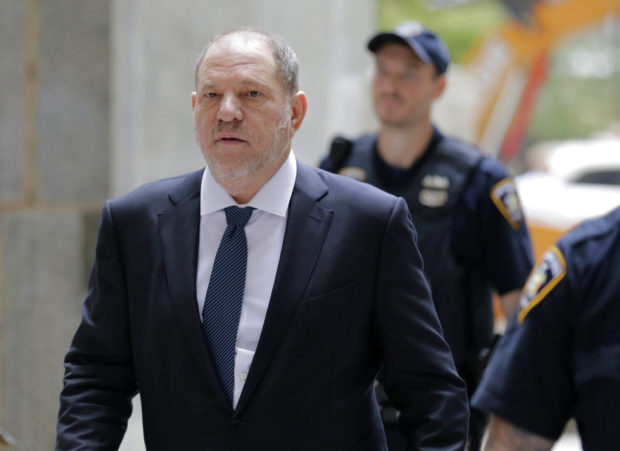Weinstein lawyers try again to get sex assault case tossed

FILE – In this Oct. 11, 2018 file photo, Harvey Weinstein arrives to court in New York. Weinstein’s lawyers are making a new attempt to get the New York sexual assault case against him dismissed. The former Hollywood producer’s attorneys say in a court filing Monday, Nov. 5, his indictment was “irreparably tainted by police misconduct,” among other problems. Image: AP Photo/Seth Wenig, File
NEW YORK — Harvey Weinstein’s lawyers asked Monday for a chance to question in court the former lead detective in his sexual assault case and the head of New York City’s special victims division, arguing the case has been “irreparably tainted” by police misconduct and should be thrown out.
The former Hollywood producer’s lawyers singled out Detective Nicholas DiGaudio — whose alleged witness coaching led prosecutors to abandon part of the case last month — as they renewed their push to have five remaining counts dismissed.
The lawyers decried DiGaudio in court papers as “a serial obstructor” who was “singularly hell-bent on concealing the truth” and proposed an evidentiary hearing be held to “determine the extent of misconduct.”
They asked that special victims chief Michael Osgood also be called to testify because he has said he and DiGaudio interviewed all potential witnesses together.
The Manhattan district attorney’s office declined to comment.
Article continues after this advertisementThe New York Police Department reiterated its statement that “the evidence against Mr. Weinstein is compelling and strong” and that it will continue to work with prosecutions “to deliver justice for the courageous survivors who have bravely come forward.”
Article continues after this advertisementThe union representing DiGaudio, the Detectives’ Endowment Association, did not immediately respond. It has previously said DiGaudio “was simply trying to get to the truth” and wasn’t trying to influence the investigation.
Three of the five remaining criminal charges against Weinstein stem from allegations he raped a woman in a hotel room in March 2013. They are also tainted by allegations DiGaudio behaved improperly. The two other charges allege Weinstein forcibly performed oral sex on her in 2006 at his Manhattan apartment.
Prosecutors dropped a sixth charge, alleging Weinstein forced Lucia Evans to perform oral sex in 2004 when she was a college student and fledgling actress, last month after evidence surfaced that DiGaudio told her friend to keep quiet when she raised doubts about the veracity of the allegations.
Assistant District Attorney Joan Illuzzi-Orbon said in a letter to Weinstein lawyer Benjamin Brafman that was unsealed on Oct. 11 that DiGaudio had advised the witness that “less is more.”
Days later, Illuzzi-Orbon disclosed an allegation that DiGaudio urged Weinstein’s 2013 rape accuser to delete material from her cellphones before handing them over to prosecutors. She said that the material didn’t pertain to Weinstein and that the woman wound up not deleting anything.
Weinstein, 66, denies all allegations of nonconsensual sex.
Weinstein’s lawyers, in their filing, also again knocked prosecutors for failing to show the grand jury that indicted him evidence they contend undermines the remaining allegations.
Repeating an earlier argument, Weinstein’s lawyers cited warm emails they said the 2013 accuser sent after the date of the alleged attack in which she welcomed plans to get together with Weinstein, sought advice and told him no one “understands me quite like you.”
In a new revelation, Weinstein’s lawyers said the 2006 accuser was also in contact with him after the date she later told authorities she was assaulted. That accuser sent a text message about seven months later seeking to meet with Weinstein, the lawyers said.
“(The accusers) had the temerity to reach out to (Weinstein) and try to engage him in social relationships — ‘after’ they now claim he viciously sexually assaulted them,” the lawyers wrote. “The sheer hypocrisy of the indictment is simply stunning.”
Gloria Allred, a lawyer for the 2006 accuser, said in an email that the Weinstein filing was “replete with unjustified speculation” that is “completely contradicted by the facts.”
“If they are engaging in speculation as to my client, I believe that they are lacking in facts which would exculpate their client Mr. Weinstein,” Allred said. “Their defense of Mr. Weinstein as to my client appears to be built on quicksand rather than on a strong factual foundation.”
Allred’s client, a former film production assistant, went public with her allegations last October but has since said that she wanted to maintain her privacy and preferred that her name not be used.
In another wrinkle, Weinstein’s lawyers argued that by dropping the Evans-related charge, prosecutors washed away the legal foundation for another charge, predatory sexual assault, which carries a maximum sentence of life in prison upon conviction.
The Associated Press generally does not identify people who say they are victims of sexual assault unless they consent to being identified publicly, as Evans has. MKH
RELATED STORIES:
New accusation of police wrongdoing in Weinstein case
Harvey Weinstein due in court as judge mulls motion to dismiss case